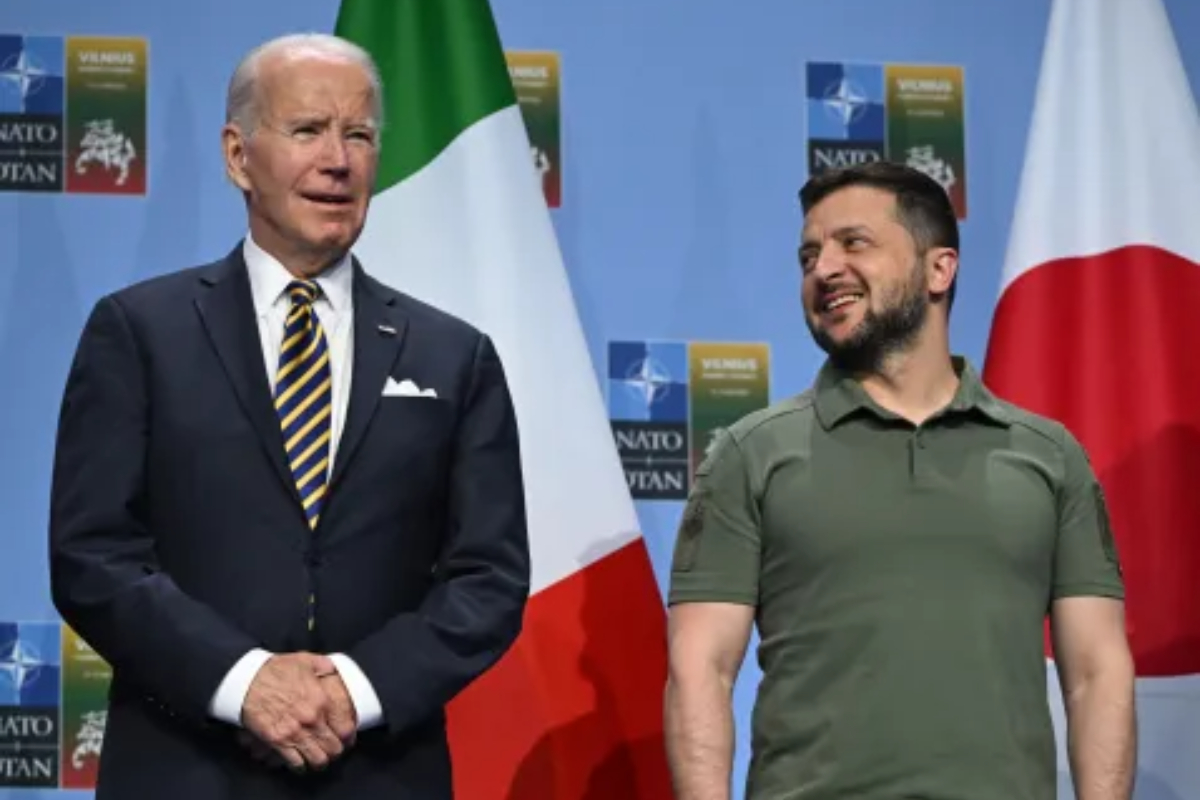- President Biden reaffirms U.S. commitment to Ukraine despite $6 billion military funding exclusion.
- $46 billion in military aid provided by the U.S. since the Russian invasion in February 2022.
- President Biden requested an additional $24 billion in aid for Ukraine.
President Joe Biden has reaffirmed the United States’ commitment to supporting Ukraine, despite the exclusion of an additional $6 billion in military funding from a last-minute congressional budget agreement aimed at preventing a government shutdown.
This funding was a key priority for the White House.
Some staunch Republicans are against providing further military assistance and openly disapprove of President Biden’s strategy in the ongoing conflict.
Nevertheless, President Biden made it clear on Sunday that Ukraine can rely on continued support from the United States.
“We cannot, under any circumstances, allow US support to Ukraine to be interrupted,” Mr Biden said.
“I can reassure [Ukraine] we’ll get there, that we’re going to get it done,” he said on restoring funding for the war. “I want to assure our American allies… that you can count on our support, we will not walk away.”
Since the full-scale Russian invasion in February 2022, the United States has already provided approximately $46 billion in military assistance to Ukraine.
President Biden has now requested an additional $24 billion in aid. Over the past few months, the U.S. has delivered advanced equipment to Kyiv, including long-range missiles and Abrams tanks.
This support coincides with ongoing efforts by Ukrainian forces to carry out a gradual counter-offensive in the southern part of the country.
However, the temporary budget agreement reached on Saturday, which will fund the U.S. federal government for 45 days, did not include sustained military funding at this time.
Senior leaders from both parties in the Senate have released a joint statement indicating their commitment to ensuring continued U.S. support for Ukraine in the weeks ahead.
This decision, which came just nine days after President Volodymyr Zelenskyy visited Washington to request further assistance, reflects a growing opposition to the war from hardline Republicans in the House of Representatives in recent months.
Republicans hold a majority in the House, while Democrats have a narrow majority in the Senate. Approval from both chambers is required for budget-related legislation to become law.
Florida Congressman Matt Gaetz stated on Saturday that the funding already authorized by Congress is perceived as more than sufficient, if not excessive.
Georgia Representative Marjorie Taylor-Green argued that too much aid has already been allocated to Kyiv, asserting that Ukraine should not be treated as if it were the 51st state of the United States.
These positions sparked strong reactions from Democratic Party senators.
“I can’t believe people are going to walk away from Ukraine at this moment in time,” Senator Mark Warner said.
Despite the row, officials in Kyiv have sought to frame this new 45-day funding agreement in the US as an “opportunity” for its diplomats to secure longer-term support. It’s more like an unwanted deadline.
Ukraine’s foreign ministry says the “flow of US aid won’t change” with $3bn of humanitarian and military support set to still arrive, but it concedes “ongoing programs” might be affected.
But one Ukrainian MP, Oleksi Goncharenko, admitted that the suspended funding was causing concern in Kyiv.
“The vote in US Congress is disturbing. The US said they would be with Ukraine as long as it takes and now see how support of Ukraine is excluded from the stop-gap deal. This is the sign of alarm, not only for Ukraine but for Europe, too,” he told the BBC.
This political instability represents one of various indications of Western weariness. The increasing skepticism among certain Republicans and the recent electoral success of a populist, pro-Moscow party in Slovakia are causing unease for both Ukraine and the European Union.
In a conversation with the BBC in Kyiv, Josep Borrell, the European Union’s top diplomat, expressed his concern regarding the recent choice made by the US Congress concerning funding for Ukraine.
“I don’t know what’s going to happen in the future,” he told the BBC. “One thing is clear: to us Europeans, the war of Russia against Ukraine is an existential threat, and we must react accordingly.”
During his daily address from Kyiv, President Zelenskyy emphasized that Ukraine’s resilience should not be extinguished by anyone.
The country is determined to persevere, whether or not it receives assistance from Western nations.
Ukraine has a clear preference, and it overwhelmingly leans towards a specific outcome.
[embedpost slug= “slovak-populists-win-but-coalition-talks-loom/”]
To stay informed about current events, please like our Facebook page https://www.facebook.com/BOLUrduNews/.
Follow us on Twitter https://twitter.com/bolnewsurdu01 and stay updated with the latest news.
Subscribe to our YouTube channel https://bit.ly/3Tv8a3P to watch news from Pakistan and around the world.





















